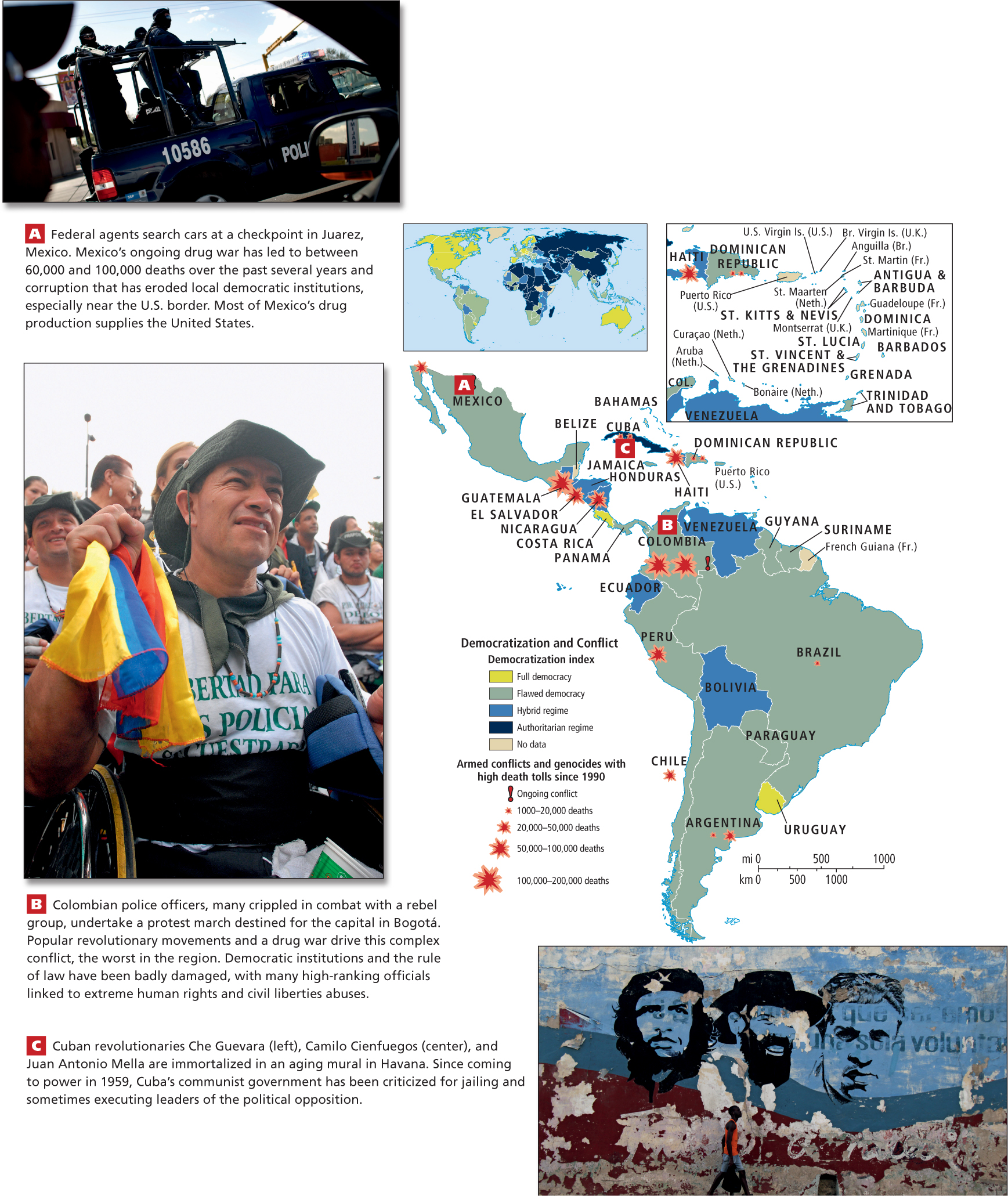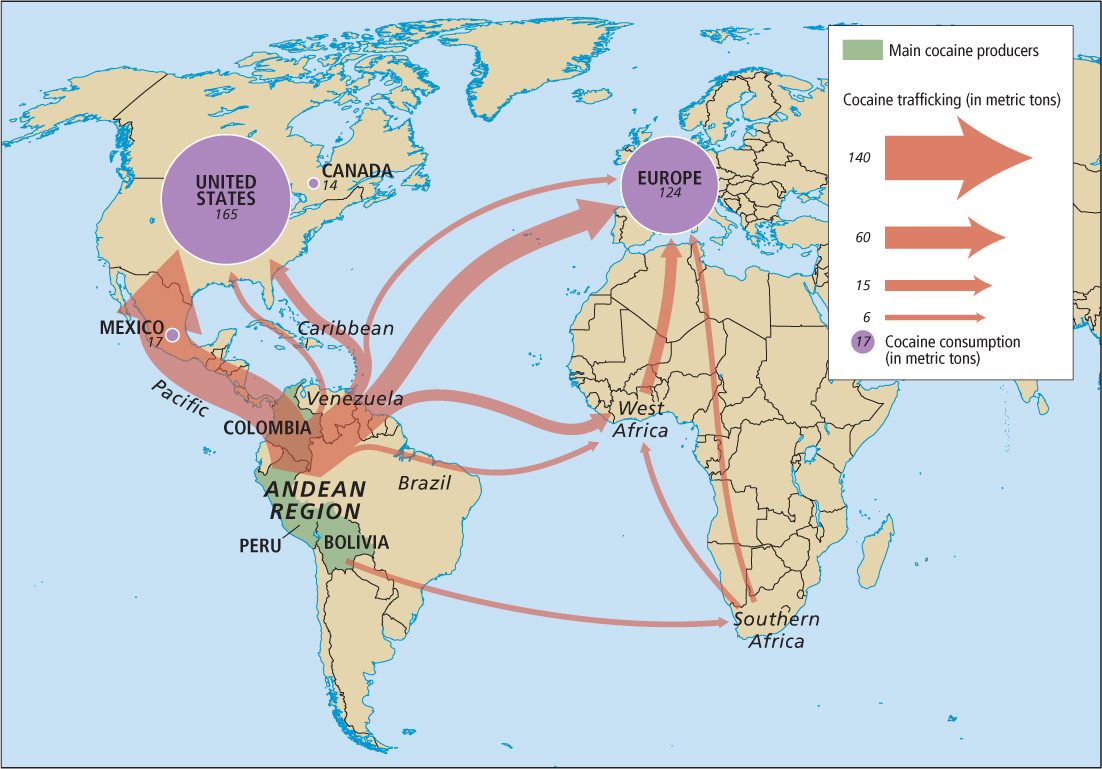Power, Politics, and the Move Toward Democracy
dictator a ruler who claims absolute authority, governing with little respect for the law or the rights of citizens
coup d’état a military- or civilian-led forceful takeover of a government

Thinking Geographically
After you have read about power and politics in Middle and South America, you will able to answer the following questions:
Question
 What evidence can you find in the photo of a violent situation in Mexico?
What evidence can you find in the photo of a violent situation in Mexico?
| A. |
| B. |
| C. |
| D. |
Question
 All of the following are the indications that these men were once involved in violent combat except
All of the following are the indications that these men were once involved in violent combat except
| A. |
| B. |
| C. |
| D. |
Question
 Why would the Cuba government lionize these men in a mural?
Why would the Cuba government lionize these men in a mural?
| A. |
| B. |
| C. |
| D. |
Hugo Chávez and Venezuela’s Fragile Democracy
In Venezuela, the landslide election of Hugo Chávez as president in 1998 appeared for a time to advance the cause of democracy there. Elites had long dominated Venezuelan politics, and profits from the country’s rich oil deposits had not trickled down to the poor. One-third of the population lived on $2 (PPP) a day, and per capita GNI (PPP) was lower in 1997 than it had been in 1977. Chávez campaigned as a champion of the poor, calling for the government to subsidize job creation, community health care, and food for the large underclass. He also limited the profits of the largely foreign-managed oil industry and redirected the profits to support government social programs. These policies, all of which were enacted soon after he was elected, eroded Chávez’s original support from the small middle class and elites, who began to fear a turn toward broad government control. When the U.S. government expressed alarm, Chávez became a major critic of U.S. and other foreign influence in the region. Chávez helped lead the region-wide backlash against SAPs and condemned the long history of U.S. intervention in the internal affairs of countries across the region.  66. SOCIAL PROGRAMS AT ROOT OF CHÁVEZ’S POPULARITY
66. SOCIAL PROGRAMS AT ROOT OF CHÁVEZ’S POPULARITY
Chávez was reelected in 2000, and then briefly deposed in a coup d’état in 2001, in which the United States participated covertly. He was quickly reinstated, however, by a groundswell of popular support among the large underclass, who stood to benefit from his policies. His presidency was sustained in a referendum in 2004 and again in the landslide election of 2006. In 2009, voters approved a constitutional amendment removing presidential term limits, thereby allowing Chávez to run for president indefinitely. Some saw this as a triumph of the populist movement (see definition), others as a loss for democracy and a drift back toward dictatorship (see the Figure 3.18 map). Hugo Chavez died in March of 2013 from cancer, after having been treated numerous times by specialists in Cuba.
The Drug Trade, Conflict, and Democracy
The international illegal drug trade is a major contributor of corruption, violence, and subversion of democracy throughout the region. Cocaine and marijuana are the primary drugs of trade, with most drugs produced in or passing through northwestern South America, Central America, and Mexico. Figure 3.19 illustrates the geographic distribution of cocaine seizures in 2008. (Note: Such seizures may not reveal activity in areas where law enforcement is lax or entirely co-opted by drug traders.)

Production of addictive drugs is illegal in all of Middle and South America. However, public figures, from the local police on up to high officials, are paid to turn a blind eye to the industry. Most coca and marijuana growers are small-scale farmers of indigenous or mestizo origin, working in remote locations where they can make a better income for their families from these plants than from other cash crops. Many rent land from the drug cartels which get the drugs to global markets. The cartels are monopolistic and violent, and those who oppose them—whether farmers, journalists, or law enforcement officials—often end up kidnapped, tortured, and brutally murdered.
In Colombia, the illegal drug trade has financed all sides of a continuing civil war that has threatened the country’s democratic traditions and displaced more than 1.5 million people over the past several decades (see Figure 3.18B). Mexico also has for several years faced increasing threats to its political stability (see Figure 3.18A) from drug cartels that control a hugely profitable U.S.-oriented drug trade.  72. THOUSANDS KIDNAPPED IN COLOMBIA IN LAST DECADE
72. THOUSANDS KIDNAPPED IN COLOMBIA IN LAST DECADE
U.S. policy has emphasized stopping the production of illegal drugs in Middle and South America and interrupting trade flows rather than curtailing the demand for drugs in the United States. As a result, the U.S. war on drugs has led to a major U.S. presence in the region that is focused on supplying intelligence, eradication chemicals, military equipment, and training to military forces in the region. One consequence of this is that U.S. military aid to Middle and South America is now about equal to U.S. aid for education and other social programs in the region. Meanwhile, drug production in Middle and South America is now greater than ever, exceeding demand in the U.S. market, where street prices for many drugs have fallen in recent years. Concerned and informed citizens of Middle and South America have increasingly been calling for radical changes in international drug policies, including the legalization of drug use in the main (U.S.) market, which they assert would cause criminals to lose interest in the drug trade.
Foreign Involvement in the Region’s Politics
Interventions in the region’s politics by outside powers have frequently compromised democracy and human rights. Although the former Soviet Union, Britain, France, and other European countries have wielded much influence, by far the most active foreign power in this region has been the United States.
In 1823, the United States proclaimed the Monroe Doctrine to warn Europeans that no further colonization would be tolerated in the Americas. Subsequent U.S. administrations interpreted this policy more broadly to mean that the United States itself had the sole right to intervene in the affairs of the countries of Middle and South America, and it has done so many times. The official goal for such interventions was usually to make countries safe for democracy, but in most cases the driving motive was to protect U.S. political and economic interests.
During the past 150 years, at various times, U.S.-backed unelected political leaders, many of them military dictators, have been installed in many countries in the region. After World War II, worried that Communism would diffuse to Middle and South America, the United States focused special military scrutiny on a number of countries. Since the 1960s, the United States has funded armed interventions in Cuba (1961), the Dominican Republic (1965), Nicaragua (1980s), Grenada (1983), and Panama (1989). Perhaps the most infamous intervention occurred in Chile in 1973. With U.S. aid, the elected socialist-oriented government of Salvador Allende was overthrown. Allende was killed, and a military dictator, General Augusto Pinochet, installed in his place. Over the next 17 years, the Pinochet regime imprisoned and killed thousands of Chileans who protested the loss of democracy. In 1998, while recuperating from surgery in England, Pinochet was arrested under a Spanish judicial order. He would have stood trial in Spain but was judged too mentally and physically impaired to be tried and was sent home to die.
The Cold War and Post–Cold War Eras
Since 1959, the Caribbean island of Cuba has been governed by a radically socialist government led first by Fidel Castro and then, starting in 2006, by Fidel’s brother Raúl. The revolution that brought Fidel Castro to power transformed a plantation and tourist economy once known for its extreme income disparities into one of the most egalitarian in the region. However, because Castro adopted socialism and allied Cuba with the Soviet Union, relations with the United States became extremely hostile. The United States has funded many efforts to destabilize Cuba’s government, and it actively discourages other countries from trading with Cuba. The United States maintains an ongoing embargo against Cuba, and so far international efforts to lift the embargo have failed.  73. EU SPLIT OVER DEVELOPMENT COMMISSIONER’S PROPOSAL TO NORMALIZE RELATIONS WITH CUBA
73. EU SPLIT OVER DEVELOPMENT COMMISSIONER’S PROPOSAL TO NORMALIZE RELATIONS WITH CUBA
With help from the Soviet Union, Castro managed to dramatically improve the country’s life expectancy, literacy, and infant mortality rates. Unfortunately, he also imprisoned or executed thousands of Cubans who disagreed with his policies, many of whom fled to southern Florida. Following the demise of the Soviet Union, Castro opened the country to foreign investment. Many countries responded, and Cuba is now a major European tourist destination. However, the Castro regime is intact, political repression in Cuba persists, and relations with the United States remain distant.
THINGS TO REMEMBER
 Democracy has transformed the politics of the region, yet problems remain. Elected governments are at times challenged by citizen protests or with a coup d’état because policies are unpopular with large segments of the population, powerful elites, or the military.
Democracy has transformed the politics of the region, yet problems remain. Elected governments are at times challenged by citizen protests or with a coup d’état because policies are unpopular with large segments of the population, powerful elites, or the military. The drug trade has emerged as a major obstacle to democracy, with huge amounts of illicit cash being used to pay off elected officials, civil servants, police forces, and the military.
The drug trade has emerged as a major obstacle to democracy, with huge amounts of illicit cash being used to pay off elected officials, civil servants, police forces, and the military.